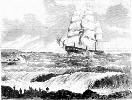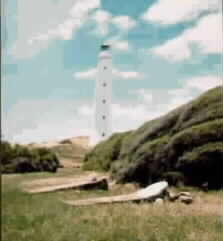 23 October 1871, only a few hundred yards from the lighthouse. He turned out to be a close relative, born in Devon, my third great-grandfather's nephew.
23 October 1871, only a few hundred yards from the lighthouse. He turned out to be a close relative, born in Devon, my third great-grandfather's nephew.
In 1981 I was visiting Cape Wickham, which is at the northern tip of King Island, in Bass Strait, between the Australian mainland and Tasmania. I literally stumbled across the headstone of Captain William Waymouth Branscombe, almost completely buried in the sand. Later, I researched his death by drowning while master of the wool clipper Loch Leven. He was the only member of the crew to perish when the iron-hulled three-masted sailing ship went aground at night, in fog, on the Harbinger Rocks, 23 October 1871, only a few hundred yards from the lighthouse. He turned out to be a close relative, born in Devon, my third great-grandfather's nephew.
23 October 1871, only a few hundred yards from the lighthouse. He turned out to be a close relative, born in Devon, my third great-grandfather's nephew.
On 26 March 1988, I was invited to represent the family at the dedication of a cairn to the memory of William and the others who had died at that remote and dangerous headland, over the years. On that occasion, I read this poem.
Stuck fast on a foreign reef
With all sails set, William,
How your mind raced in the darkness
With the booming spectres of wrack
And ruin.
Frightened sailors bellowing at the fog,
Not knowing, as they spilled from their hammocks,
If the still-echoing shriek
Of iron on rock
Was to sound their epitaph.
Now your thoughts have flown
To the deep green lanes of Devon;
The wind-furrowed faces of mariners
Sucking on thin clay pipes
As you sit at their feet, in childhood,
Building new dreams from their flotsam,
On a pebble beach with upturned boats,
Where crabs crouch and sea meets sky.
Dreams that are unravelling,
As the rocking whaleboat leaves the lee
And plunges wildly in piling waters
Between the Loch and the lofty light.
Embraced at last by the element you sought
To bend to your will,
Do you now hear a roaring tide of blood within?
An undertow that draws its power
From the stone-crowned hills of home?
It flickers still
On this day,
On your lonely bed of earth,
Under a rising moon,
Like Saint Elmo's Fire.